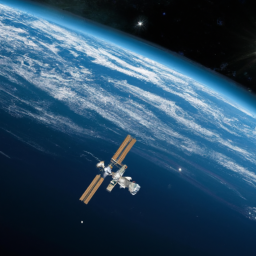The human spirit is characterized by an insatiable curiosity and a profound desire to explore the unknown. This intrinsic drive has propelled humanity to venture beyond our earthly confines and into the vastness of space. The International Space Station (ISS) stands as a testament to this quest for knowledge and exploration, serving not only as a scientific laboratory but also as a launchpad for future deep-space missions. The ISS, a collaborative effort involving multiple nations, has been continuously inhabited since November 2000. It orbits the Earth at an altitude of approximately 400 kilometers, providing a unique microgravity environment for scientific research and technological development. In my experience observing the evolution of space exploration, the ISS has played a pivotal role in advancing our understanding of life in space and the effects of long-duration missions on the human body. Research conducted aboard the ISS has yielded significant insights into various scientific fields, including biology, physics, and materials science. For instance, studies show that microgravity affects muscle atrophy and bone density loss, which are critical considerations for future missions to Mars and beyond. Experts agree that understanding these physiological changes is essential for ensuring the health and safety of astronauts during extended periods away from Earth. Moreover, the ISS serves as a testing ground for technologies that will be vital for deep-space exploration. According to official reports from NASA, advancements in life support systems, radiation shielding, and habitat design have all been tested in the ISS environment. These innovations are crucial for missions that will take astronauts further into the solar system, where conditions are harsher and more unpredictable than those experienced in low Earth orbit. The collaborative nature of the ISS is also noteworthy. It is a symbol of international cooperation, involving space agencies from the United States, Russia, Europe, Japan, and Canada. This partnership has fostered a spirit of unity in the pursuit of scientific discovery. As observed, the collaboration among these nations has not only advanced our scientific knowledge but has also strengthened diplomatic ties, showcasing how shared goals can transcend political differences. In addition to its scientific contributions, the ISS has inspired a new generation of scientists, engineers, and explorers. Educational programs linked to the ISS have engaged students worldwide, sparking interest in STEM (science, technology, engineering, and mathematics) fields. Research confirms that exposure to space-related activities can motivate young people to pursue careers in these critical areas, which are essential for the future of innovation and exploration. Looking ahead, the ISS is set to play a crucial role in NASAs Artemis program, which aims to return humans to the Moon by the mid-2020s and establish a sustainable presence there. This lunar exploration will serve as a stepping stone for future missions to Mars. Industry experts note that the knowledge gained from operating in the ISS environment will be invaluable for developing the technologies and strategies needed for deep-space travel. Furthermore, the ISS has provided a platform for international partnerships that extend beyond governmental space agencies. Private companies are increasingly involved in space exploration, contributing to the development of commercial spacecraft and research initiatives. This shift toward privatization is changing the landscape of space exploration, allowing for more diverse contributions and innovations. According to government data, the involvement of commercial entities is expected to accelerate the pace of exploration and reduce costs, making deep-space missions more feasible. However, the future of the ISS itself is not without challenges. As its infrastructure ages, discussions are ongoing regarding its sustainability and potential decommissioning. Experts agree that a strategic plan is necessary to transition from the ISS to future platforms, whether they be commercial space stations or lunar bases. The need for a clear roadmap is critical to ensure that the momentum gained from the ISS is not lost. In conclusion, the International Space Station has been instrumental in advancing human knowledge and capabilities in space exploration. It has provided invaluable insights into the effects of microgravity on the human body, tested essential technologies for future missions, and fostered international collaboration. As we look to the future, the ISS will continue to serve as a vital stepping stone for humanitys journey into deep space. The lessons learned and the partnerships forged through this remarkable endeavor will undoubtedly shape the next chapter of exploration, pushing the boundaries of what is possible and inspiring generations to come.
TRENDING NOW
WORLD
Global Messaging Trends: Can Local Apps Like Arattai Overtake Giants?
44% 🔥
POLITICS
Accusations fly over whether Republicans or Democrats 'own' shutdown
35% 🔥
POLITICS
Rep. Mike Haridopolos, R-Fla., talks about the government shutdown
34% 🔥
POLITICS
What happens now that the government has shut down. And, a pricing deal with Pfi...
26% 🔥
POLITICS
Married, but no connection: Reality of silent divorces in Indian homes
31% 🔥
POLITICS
Netanyahu's apology to Qatar, phone on Trump's lap: A telling White House photo
38% 🔥
MOST READ
SPORTS
Week 5 NFL odds, lines, betting picks, spreads: 2025 predictions: Model backs Sa...
55% 🔥
SPORTS
Predicting every undefeated college football team's first loss: Will anyone beat...
36% 🔥
SPORTS
Tigers Lefty Tarik Skubal Deserves Second Straight AL Cy Young Award
54% 🔥
SPORTS
Jets Get Official Braelon Allen Injury Diagnosis
61% 🔥
SPORTS
Gill: India won't be 'looking for any easy options' against West Indies
49% 🔥
SPORTS
Phil Mickelson takes a jibe at golf during friendly banter with ex-LIV Golf CEO’...
39% 🔥

